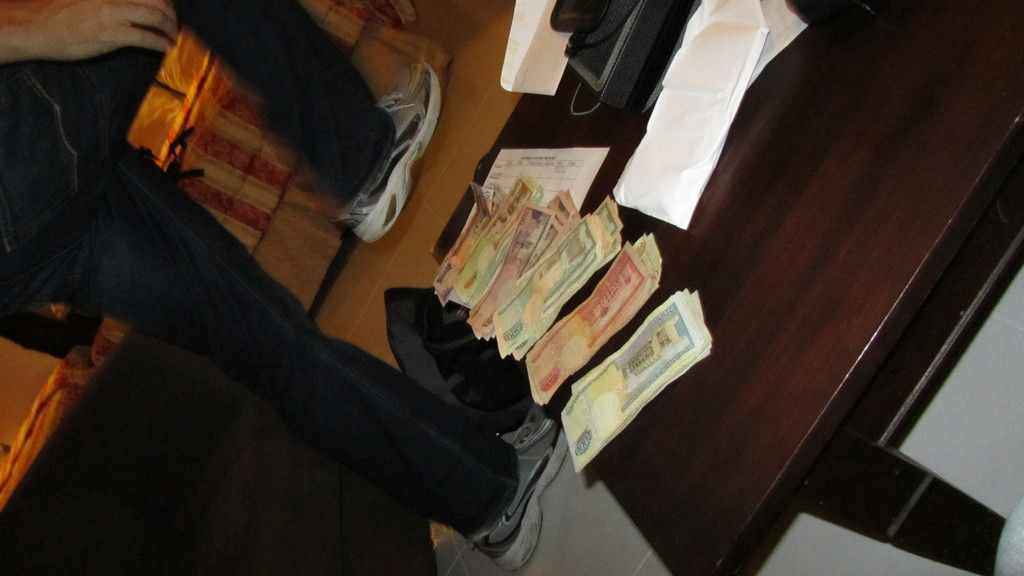Popping Corks in the Kremlin: Israel's Conflict with Iran is a Lifeline for Russia's War Economy
By Hannes Vogel
Iran's military conflict with Israel serves as a strategic respite for Putin
The ongoing chaos in the Middle East becomes a critical advantage for Russia's ailing war economy: Israel's airstrikes drive up oil prices - and consequently, Putin's revenues. And they provide Trump with fresh reasons to maintain the price cap and keep the Kremlin's war chest intact.
Donald Trump stirred up some controversy at the G7 summit in Canada with a surprising remark: "Don't forget that sanctions cost us a lot of money," said the US president. "When I sanction a country, it costs the US a lot of money. We're talking about billions of dollars." His warning effectively sunk the major industrial nations' plans to further impede Russia's war machine in Ukraine with fuel restrictions.
On the other side of the fence, the EU, Britain, Canada, and other major EU countries were largely in agreement that the price cap of $60, initially implemented at the end of 2022 for international sales of Russian oil, should be lowered further. A few weeks ago, the EU Commission proposed in its 18th sanctions package draft to reduce the price cap for sales to $45, aiming to exert more pressure on the Kremlin and end its aggression in Ukraine.
Politics: The EU Slashes the Oil Price for Putin's Pain
The timing seemed perfect. The cost of black gold was lower than usual, Russia's revenues were dwindling. The cartel of major oil-producing countries - Opec+ - was fragmented: The Kremlin wasn't adhering to the agreed-upon production cuts designed to keep prices high since it urgently required revenues to finance its war in Ukraine. Saudi Arabia, on the other hand, had entered the price war against Moscow, determined to suppress Russian competition. Ideal conditions, thus, for further measures to pressure prices.
ntv Certificates: Short-term Reaction or New Trend? What Could Happen Next with Oil Prices
But then Benjamin Netanyahu's assault on Iran happened. The Middle East conflict throws a spanner in the works. Alongside the nuclear deal, the planned sanctions against Russia are the most significant diplomatic casualties of the bombing attacks. Vladimir Putin emerges as the biggest winner: the conflict not only deflects attention from the daily acts of terror perpetrated by his own air force on Ukrainian cities, but it also drives up oil prices and fills the gaps in his war chest. And provides Trump with another reason to keep the tap open for Moscow.
In the Kremlin, Bubbly Eccentricity Abounds
Even before Israel's attack, the U.S. president wasn't particularly inclined to confront Vladimir Putin regarding Ukraine. Although Republican congressmen in the U.S. are now gearing up for harsher sanctions, he embarked on a cozy course with Moscow. Now, Washington has far more pressing matters on its agenda than the Kremlin's aggression in Ukraine, thanks to the conflict with Iran. And another justification for not further targeting its economic foundations.
Economy: Brent Soars Dramatically: Iran Conflict Puts Pressure on the Price Cap Coalition
The Iran conflict is pushing up oil prices and straining the price cap coalition. The cap artificially lowers the cost of Russian oil to weaken Putin's war chest: If it costs more than $60 and originates from Moscow, it cannot be traded in the West. This artificial scarcity could drive prices up even further in the volatile situation. Trump has no interest in this. U.S. inflation is already skyrocketing due to his trade war and debt binge.
Economy: German Heating Oil Prices Climb by Six Euros since May due to Iran Escalation
Meanwhile, Moscow reaps considerable benefits from the war: With the commencement of the bombing, the price of Russian Ural oil jumped by 15 percent in just a few days, according to the "Moscow Times," citing a Russian investment company. The Kremlin desperately requires these unexpected profits. Even the increased prices are far below the amount that Putin's finance ministry has projected for this year. Moscow's budget deficit will more than triple this year, with oil and gas revenues plummeting by more than half in May compared to the previous month.
The Cap is Far Too Loose
The plan to strangle Putin's main source of income is no longer effective due to glaring design flaws in the price cap. The cap is porous, ineffective, and fails to successfully restrict Putin's oil business: With a fleet of dusty relics, their ownership obscured by shell companies and questionable backers, the Kremlin has been circumventing sanctions since day one.
Economy: Putin Wins the Oil War, War Chest is Full
The price cap is not an actual embargo, merely a weak compromise: It aims to apply worldwide by banning shippers from transporting Russian oil, prohibiting traders from purchasing it for more than $60, and preventing banks and insurers from financing or insuring oil deals above that limit. The problem is that even in Europe, hardly any nation strictly implements the rules, and there are few investigations or fines. And beyond the West, numerous shippers, traders, and insurers don't comply. Most deliveries are now handled without Western insurance. And because smuggled Russian oil becomes cheaper, there's less incentive for India and China to buy expensive oil from the West. They are now virtually Putin's only customers.
Can Europeans Go Solo?
With Trump's departure from the price cap coalition, the question that has been gathering steam since his withdrawal from the Western alliance is: Will the Europeans have the courage to face the challenge alone? Before the G7 summit, EU foreign policy chief Kaja Kallas emphasized that the EU could lower the price cap independently if needed. "If we and the rest of the G7 support a lower price and the Americans don't, that's still something we should aim for," Kallas said, citing EU sanctions chief David O'Sullivan. However, Trump's early departure from the G7 summit appears to have deflated the initiative. According to "Bloomberg," some EU countries are now hesitant to act alone without the U.S., fearing that without Trump, the united support among EU countries may falter. The warlord in the Kremlin will undoubtedly be pleased.
Source: ntv.de
Vladimir Putin Russia Oil Price Middle East Conflict
- The Middle East conflict, triggered by Israel's assault on Iran, has become a critical advantage for Russia's ailing war economy, as rising oil prices due to the chaos increase Putin's revenues.
- The ongoing chaos in the Middle East, in turn, provides President Trump with fresh reasons to maintain the price cap and keep the Kremlin's war chest intact.
- The EU, in contrast, is proposing a lower oil price cap to further pressure the Kremlin and end its aggression in Ukraine, but the Iran conflict complicates these plans.
- The price cap artificially lowers the cost of Russian oil to weaken Putin's war chest, but with the ongoing Middle East conflict pushing up oil prices, the cap becomes less effective, allowing the Kremlin to bypass sanctions and increase its oil business.




